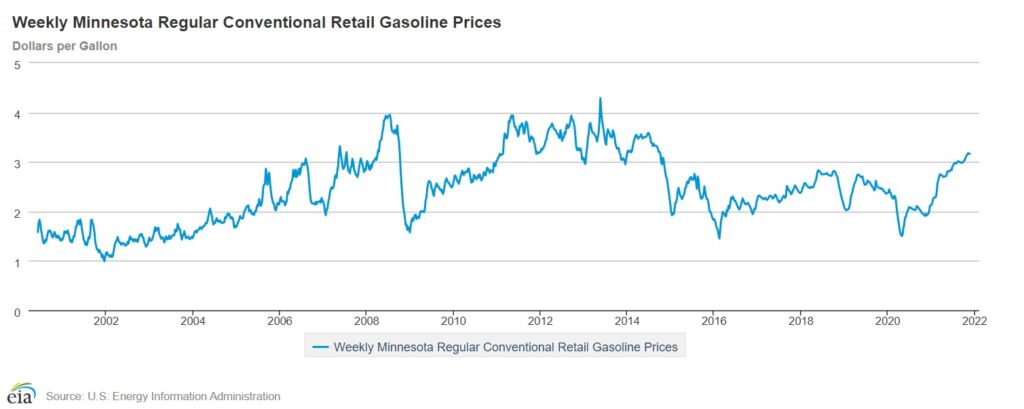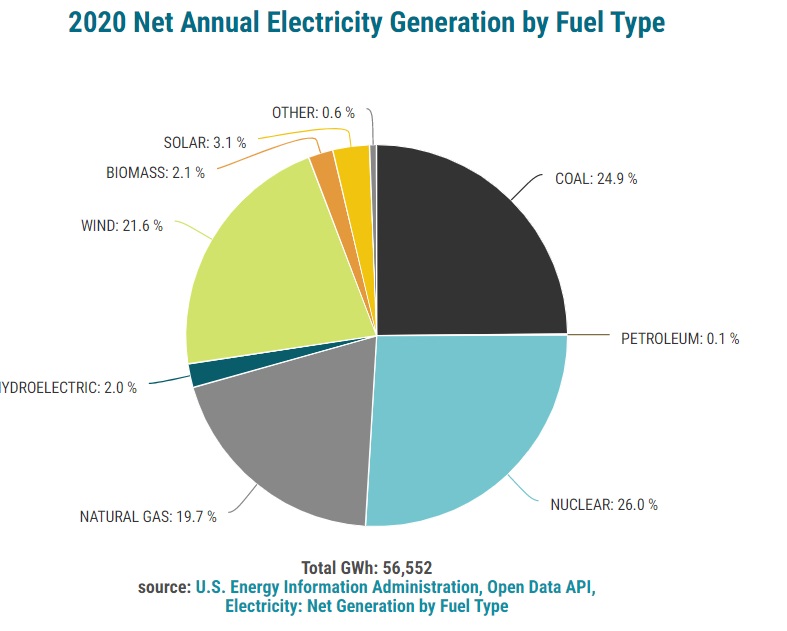Despite rising prices, DFL lawmaker wants to boost gasoline taxes
Gasoline prices in Minnesota are the highest they’ve been since the Obama administration. Despite these rising prices, State Representative Frank Hornstein (D) wants to increase the gas tax to discourage driving and bring down carbon dioxide emissions from the transportation sector, according to an article in the Minneapolis Star Tribune.

Rep. Hornstein was one of only two state legislators to attend the COP26 climate summit in Glasgow, Scotland. According to the Strib article, Hornstein returned from Scotland ready to increase the gas tax in the name of reducing carbon dioxide emissions from drivers:
Even in the transportation realm, COP26 wasn’t much of a trade show. It didn’t give Hornstein much to report on new whiz-bang technologies for cutting carbon emissions.
Rather, Hornstein said, COP26 “reminded us that the biggest issues we face in cutting emissions are not technical. They are political. We have the know-how to solve this problem. Now we have to have the spirit and the political will.”
Hornstein’s assertion that the biggest roadblocks to reducing emissions are political, not technological, is just plain wrong.
For example, electric vehicles (EVs) are less useful than gasoline vehicles because they have limited range and long recharging times. This is why Metro Transit scrapped its plan to buy electric buses and bought diesel buses instead. Electric vehicles are also more expensive than their diesel-fueled counterparts, which present additional financial hurdles to switching from gasoline and diesel-powered vehicles to electric cars.
Even if we could wave a magic wand and transform all of the gas-powered vehicles in Minnesota into EVs, how would we charge them?
Minnesota’s electric grid is predominantly powered by nuclear, coal, wind, and natural gas, but companies like Xcel Energy and Minnesota Power want to shut down their coal plants and hope the sun is shining or the wind is blowing.

But this is the same strategy that California has pursued, and it isn’t working. This year, there were several instances where the grid operator in California begged people to reduce their use of electricity consumption during periods of peak demand. This includes refraining from charging electric vehicles.
These are massive, real-world challenges involving the physics of the transportation and electrical systems we rely upon every day. If Rep. Hornstein is unaware of these pitfalls or ignores them, he will be signing Minnesota up for expensive policies that reduce the qualify of life for all Minnesotans.
The article in the Strib continues:
And despite the rising price of gasoline, Hornstein hasn’t given up on the notion of a boost in Minnesota’s original carbon tax — the highway-dedicated gas tax. Though he knows it’s projected to be a declining source of revenue as electric vehicle sales increase (“I hope so!” he said), it still pays for road improvements, freeing other funds for climate-related measures.
Everyone agrees that we need to pay for our roads and bridges, and the gas tax plays an important role in funding the maintenance of this infrastructure. However, raising the gas tax to reduce carbon dioxide emissions is a punitive policy that will disproportionately harm low-income families and rural Minnesotans.
These Minnesotans will be hurt the most because they pay the highest share of their income on their energy bills. Residents of Greater Minnesota also have to drive further to get to work, the grocery store, or go shopping for school supplies. This is less of a problem in Hornstein’s densely populated Minneapolis district, but it is a cruel tax on rural Minnesotans for zero impact on future global temperatures.
Minnesota’s transportation sector emitted about 40.3 million tons of carbon dioxide in 2018, according to the Minnesota Pollution Control Agency. To calculate the temperature impact of eliminating all of these emissions, we can use the same logic used by the Obama Administration to craft the Clean Power Plan (CPP), which was widely considered to be the administration’s signature climate change initiative.
The CPP would have averted 730 million metric tons of carbon dioxide annually, which in turn would have averted 0.019 degrees C by 2100, according to the Obama administration’s own climate models. This amount is too small to accurately measure with even the most sophisticated scientific equipment.
Reducing our annual emissions from 40.3 million tons (36.5 million metric tons) to zero tons would avert about five percent of the reductions from the Clean Power Plan. We can then determine the temperature impact of the regulation by multiplying 0.019 degrees C by five percent, which gives us a temperature reduction of 0.00095 degrees C by 2100, an amount far too small to measure.
Rep. Hortstein’s statements are alarming because they are divorced from the energy reality that we live in. Because he does not understand that the challenges to reducing emissions are technical and not political, he is willing to endorse rising gas taxes that will harm all Minnesota families, especially those who can least afford it, for absolutely zero measurable impact on future global temperatures.